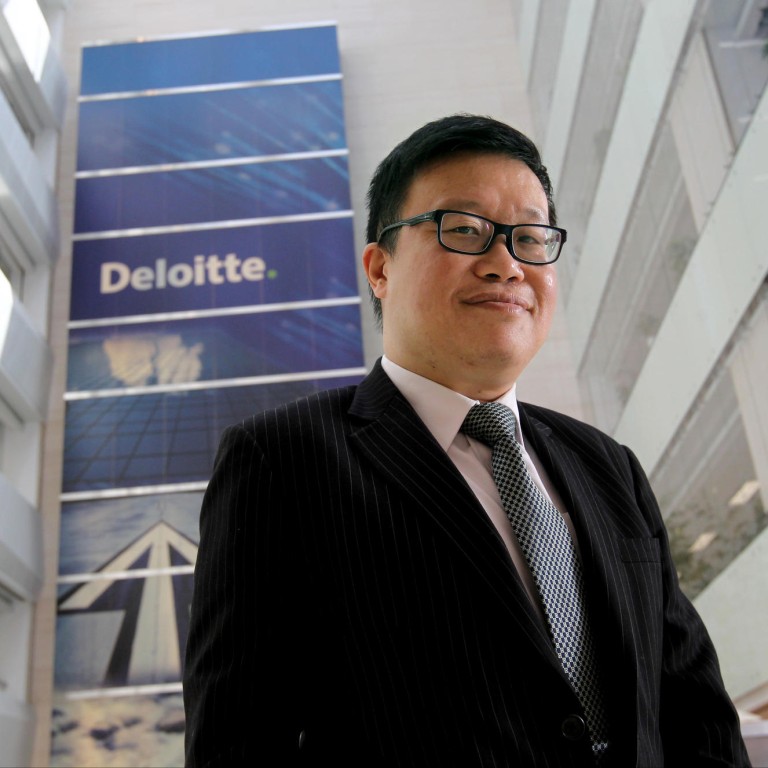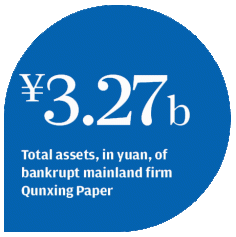
Hong Kong investors at a disadvantage when firms with assets in China go bankrupt
The 'one country, two systems' principle puts Hong Kong receivers at a disadvantage when dealing with assets held on the mainland
The HK$4.1 billion bankruptcy proceedings involving a mainland subsidiary of Hong Kong-listed decorative paper maker Qunxing Paper highlight the risks to investors of acquiring exposure to firms that have the bulk of their assets outside the city.

The proportion is likely to increase further with a wave of asset injections by Chinese state-owned enterprises following in the footsteps of Beijing conglomerate Citic Group, which said last week it would inject its entire business into Citic Pacific, its Hong Kong-listed subsidiary.
"This is worrying, since many mainland companies have their assets located in mainland China," said veteran liquidator Derek Lai, the Asia-Pacific leader of restructuring services at Deloitte Touche Tohmatsu, who has handled many bankruptcies of Hong Kong-listed mainland companies.
"If they go bankrupt, the 'one country, two systems' principle means Hong Kong receivers and liquidators cannot freely handle the assets on the mainland, [the disposition of which depends] on the decisions of mainland courts, which may be more favourable to mainland creditors and employees.
"This has made it hard to retrieve assets for offshore creditors and shareholders."
Lai said the results could vary: some mainland courts allowed him to recover between 40 per cent and 100 per cent of the mainland assets for Hong Kong creditors and shareholders, while in other cases, Hong Kong investors got nothing.
"The Hong Kong government should work with the central government to sign an agreement to allow Hong Kong-based liquidators or receivers to have a free hand on the mainland to handle the bankruptcies for these mainland firms listed in Hong Kong," he said.
"This will provide better protection for Hong Kong creditors and investors."
The Securities and Futures Commission said on Monday it had obtained a Hong Kong court order to appoint interim receivers to take over the management of Qunxing Paper after its major subsidiary, which holds most of the group's 3.27 billion yuan (HK$4.1 billion) of assets, secretly initiated bankruptcy proceedings on the mainland.
The court will hold a hearing on Friday to decide whether to extend the appointment of the receivers and to hear an application by Qunxing to remove an SFC injunction in December freezing HK$1.9 billion of Qunxing's assets for allegedly giving misleading information in its listing prospectus in 2007 and documents related to its warrants in 2011.
But even if the court rules in favour of the SFC, the firm's Hong Kong investors may not get back much.
The firm has only HK$150 million as deposits in Hong Kong that could be frozen under the injunction. Most of its assets are held on the mainland by the subsidiary that has now started bankruptcy proceedings in a mainland court.
Alan Tang Chung-wah, a partner and head of specialist advisory services in the Hong Kong office of mainland accounting firm ShineWing, said an offshore receiver faces a major uphill battle when seeking to have his or her office and authority formally recognised in a mainland court.
"This is because the concept of 'receivership' is alien to mainland law," Tang said. He said offshore insolvency practitioners should work with mainland legal and accounting professionals who know mainland bankruptcy law and practice well, as they would be in a better position to handle many issues on behalf of the Hong Kong creditors and shareholders as well as those from the mainland.
"Under the mainland Enterprise Bankruptcy Law, any reorganisation plan should cover all creditors and shareholders, regardless of location, while they all should have a say in whether the plan should be approved or not," Tang said.
He said even if a company had assets both in Hong Kong and on the mainland, they would need to be handled as a pool and not separately. This is based on a 1999 High Court ruling in the case of the liquidation of mainland firm Gitic. The court treated all creditors equally and refused to grant Hong Kong-based creditors a preferential right to take and sell Gitic's assets in the city.
Peter Bullock, a partner at Pinsent Masons in Hong Kong, said while Hong Kong bankruptcy proceedings are transparent for all banks and regulators, mainland bankruptcy procedures under the Enterprise Bankruptcy Law are more opaque.
"Even where such proceedings come to the attention of a Hong Kong regulator, those in Hong Kong are often powerless to intervene, as they have no preferred status in the mainland," Bullock said.
"This allows individual creditors, and perhaps even unscrupulous directors, to use the Chinese process to their advantage," he said.
"It is premature to state that the mainland courts will assist those behind the company to cut the public shareholders of the parent out of a share in the assets, but it is a fair assumption that the directors would prefer to have the Chinese courts determine the issues than a Hong Kong court-appointed receiver."

